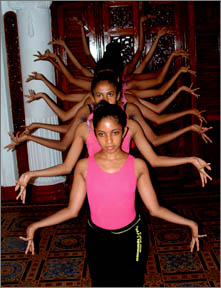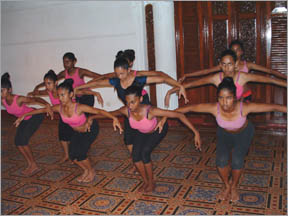Dances with a difference
Natanda :
by Jayampathy Jayasinghe
|

Pix by Priyantha Hettige
|
Kapila Palihawadana took to dancing like a duck taking to water when
he was only 14 years while at school. A versatile dancer, he had the
rhythm in him, an essential component for any type of dancing.
Therefore dancing wasn't a tedious task as far as he was concerned.
It came naturally to him. He proceeded to Germany in 2004 after winning
a Goeth institute scholarship where he learnt contemporary dancing.
Whilst in Germany he studied dancing for a year before returning to Sri
Lanka. While in the cities of Berlin, Frieberg and Heidelberg he worked
with the best dancing companies there.
Kapila learnt contemporary modern dancing under celebrated teachers
like Christino Kone, Biasuty, and Tommi Passonen. "Whilst in Friberg I
worked for a company called Dance Theatre.
My dance teachers were Irina Pauls, Christino Kono from Japan, and
Tomi Passonen from Brazil. People from different parts come there almost
every day to learn dancing from 10 a.m. to 12 p.m." he said. He learnt
choreography whilst in Friberg and in Berlin from teachers like Sasha
Waltz, Irina, Pauls and Manuel Quero from Germany and David Boler from
Ireland. Since then Kapila had come a long way.
Dancing was his forte and he continued dancing even after entering
the Keleniya University where he read for a Bachelor of Arts degree and
got a second Upper class. He also lectured at the Keleniya university.
As a student Kapila learnt Kandyan, Low Country and Baratha Natyam
dancing under the tutelage of well known gurus.
Kapila was the principal male dancer of Channa Upuli Performing Arts
School when the group toured India and Germany in 1999. He was
introduced to western classical ballet by Oosha Sarawanamuttu and was
the sole dancer in "Joie de la dance" in 2003.
 He was a student of Horana Sripali Vidyayala. After returning to Sri
Lanka, an idea dawned upon him to start a dancing school but couldn't
find a suitable place. But he forged ahead and formed a dancing centre
named "Natanda" with the co-operation of the German Cultural institute
at their premises in Colombo. He was a student of Horana Sripali Vidyayala. After returning to Sri
Lanka, an idea dawned upon him to start a dancing school but couldn't
find a suitable place. But he forged ahead and formed a dancing centre
named "Natanda" with the co-operation of the German Cultural institute
at their premises in Colombo.
Now there are 17 students, altogether, five boys and twelve girls
undergoing training at the Natanda dancing centre coached by Kapila
himself. Classes are held on a regular basis on Saturdays, Sundays,
Tuesdays and Thursdays for students.
Asked how much a student had to pay to enrol at the dance theatre,
Kapila replied the dance classes were absolutely free for beginners. He
said he was looking for young persons talented in dancing between the
ages of 16-25 and was hopeful of initiating dance classes for juniors
under the age of 10 years.
"I am very concerned about the style of dancing. Basically what I do
is to incorporate elements of traditional local dancing into western
dancing techniques. The arm movements of Kandyan, Low Country and the
Indian dancing forms are merged with western dance techniques to create
contemporary dancing.
Western dance syllabuses are more vividly described than the local
syllabuses and were more disciplined. Especially ballet forms of
dancing," he said. Kapila lamented the fact that there wasn't a suitable
dance studio in Colombo for students to practise dancing.
He will be presenting his second dance performance called "MODABORN"
on February 24 and 25th 2007 at the Lionel Wendt Theatre at Guildford
Crescent Colombo 7.
 His first two performances, MOKABALO were held at the Lionel Wendt
Theatre on the 10th and 11th February and at BAREFOOT on 21 June 2006.
MODABORN dance also depicts facets of life, such as birth living and
death. Boys were seen clad in sarongs and girls in Elephant pants. His first two performances, MOKABALO were held at the Lionel Wendt
Theatre on the 10th and 11th February and at BAREFOOT on 21 June 2006.
MODABORN dance also depicts facets of life, such as birth living and
death. Boys were seen clad in sarongs and girls in Elephant pants.
Dancing is colourful and vibrant. Contemporary dancing over the years
have catapulted into modernity. Kapila has infused a breadth of fresh
air into MODABORN dance.
The first dance is called colour, second called Geggii-Bells and
third is a solo dance followed by a dance by two boys and then by three,
called vibration.
There is also a specific dance called SECRET OF NATURE like the
18-Wannanam in the Kandyan dancing. Kapila speaking to the Sunday
Observer stressed the importance of creating a separate identity for the
Sri Lankan dance.
"If we simply imitate the dance styles of Europeans I cannot compete
with them. It has to be a different form of dancing" he said. Asked what
his projections for the future were and Kapila replied that he plans to
stage a dance named PEACETALK comprising of 120school children.
Kapila is of the view that dancing as a profession has not thrived in
Sri Lanka due to poor emoluments being paid to artistes. But in Western
countries the artistes were quite well off, he said.
Modern Dance includes ballet jazz and other dance tradition pioneered
in the United States at the beginning of the 20th century. Developed by
Martha Graham and Isadora Duncan among others. Modern dance is unique in
its focus on creative expression and its artistic response to the
social, economic and political environment.
[email protected] |
